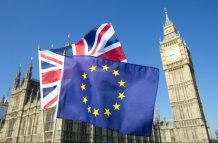
A year on from the referendum, Exetra revisited Brexit and discussed its implications.
How will Brexit affect London?
Exetra, the recent alumni group, held an event in June 2017 which focused on Brexit and looked to tackle the questions of how different sectors could be affected by Brexit, what affect this could have on London and what affect might this have on the young workers of today?
To answer these questions they invited a panel of leading professionals in their field, three of them graduates of Exeter, to give their views on the subject. This was followed by an opportunity for the audience to ask questions before networking over drinks and canapes.
In case you were not able to attend the event, or would like a reminder, below is a summary of each of the panellists’ talks.
Andrew Hood, Senior Director, Dechert LLP (Law with European Study 1998)
Andrew Hood, host and panellist, began the evening by welcoming people to event. He firstly spoke about the context of Brexit, setting the scene for the choices and actions that led to the vote. He then went on to speak about the possible effect of Brexit on law and concluded that, barring some specific areas, he could not foresee that Brexit would have a large impact on the sector in the imminent future. He went on to explain that in some areas such as trade law, Brexit had actually expanded opportunities in the sector and therefore advised that it was still a good area for recent graduates to consider applying to.
Edward Boyd, Managing Director at Centre for Social Justice (Economics 2006)
Edward Boyd spoke about the factors behind the Brexit vote and about some of the statistics and figures one can draw from it, for example the clear difference in voting pattern between the poor and the rich; the young and old. He explained that the Brexit vote revealed a number of different things. That there were people who have been getting left behind over the past few decades and who were in poverty, and that they tended to vote against the establishment. He spoke about how our answer to Brexit must be more than trade deals and free movement, but focus on the root causes of poverty - the things that are holding people back from having every opportunity of making the most of their potential.
He also spoke about how important it is for the country to start to focus on how to make leaving a success, rather than focusing on whether it should have happened, and stressed the importance of leadership in ensuring that the country can agree on a future vision we would like to work towards. He concluded that now is actually quite an exciting time to get into politics and that there will be a large number of opportunities available if graduates are interested.
Pete Jackson, Freelance Strategy Director (Psychology 2006, MSc International Management 2007)
Pete Jackson spoke about the marketing and advertising sector, he had gathered thoughts from some of the leading names in the field to inform his presentation. His conclusions were threefold. Firstly there had been a significant change in the sector since the change in value of the pound, with many other countries’ companies looking to buy British companies. Secondly, he explained how a ‘hard’ Brexit that would restrict borders would be very difficult for the industry as it thrives on diversity within teams and flexibility. He spoke about how many other places in Europe such as Amsterdam and Paris are looking to make themselves creative centres and so a ‘hard’ Brexit could risk drawing talent away from London to these other cities. Finally he concluded that whilst advertising as a sector will potentially become even harder to get into, graduates can stand out by acquiring key digital skills and knowledge, and be optimistic that if one can manage to get in now, it will put you in a very strong position in five years’ time as talent shortages at senior level tend to happen 5-10 years down the line from a dip in the economy.
Professor Alison Harcourt, Politics, University of Exeter (Communications)
Alison Harcourt spoke about the effect of Brexit on the communications industry and identified that there was a large number of possible implications of Britain leaving the EU. Perhaps the biggest of these is that the country may leave the Digital Single Market (under a ‘hard Brexit’ scenario). The Digital Single Market facilitates cross border digital services, enabling services such as on-line banking, on-line shopping sites, and cross-border services such as the BBC, Sky and Netflix to operate across European borders without restrictions. If we leave this, British based companies would not be able to operate in Europe without re-locating their headquarters to an EU member state, potentially causing a large number of companies to leave London. Additionally even if we do not leave the market, we will lose voting rights on important legislation acts which is significant as there are currently 19 legislation acts under review. Alison concluded that Brexit poses a lot of risk to our currently very successful communications industry and that a lot of policies and agreements will need to be agreed to ensure that we can maintain it in the future.
Date: 23 June 2017
